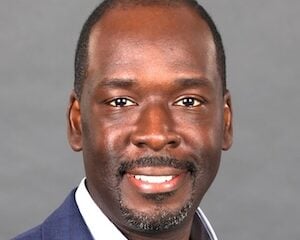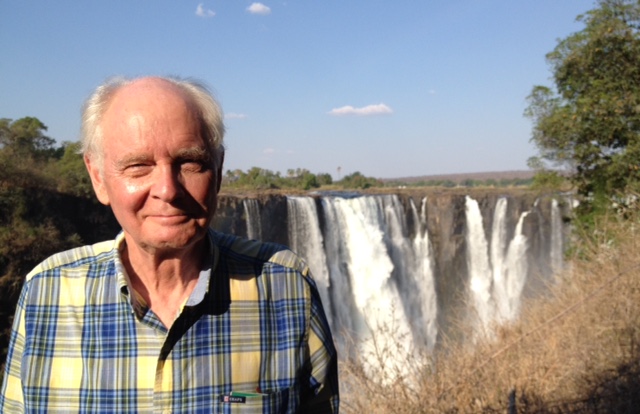Former KCET president Bill Kobin dies at 91

Kobin

William H. Kobin, a public television executive who led KCET in Los Angeles and spearheaded a diverse range of programs, died Jan. 8 at his home in Brentwood, Calif., due to health complications caused by Parkinson’s disease. He was 91.
Kobin, known to friends and colleagues as Bill, was a lead programmer for the network that was succeeded by PBS. He also led TPT in St. Paul, Minn., before becoming president and CEO of KCET from 1983–96.
Kobin is also credited with helping jumpstart the television careers of Bill Moyers and of Huell Howser, a television host who died in 2013.
“He was a strong and robust and sometimes controversial champion of public affairs,” Moyers said in a 2014 broadcast celebrating KCET’s 50th anniversary.
In an interview with Current, Patt Morrison, a former co-host for the KCET news program Life & Times, said that for all Kobin’s success, he was open-minded and listened to his staff’s needs.
“It would’ve been so easy for him to coast on the fumes of glory,” she said, “but he was eager to hear new ideas.”
“We in Iowa, just starting a state network, were very envious of Minneapolis’ supportive community,” said David Brugger, a former director of administration for Iowa PBS. Brugger later became GM at WUFT in Gainesville, Fla., SVP at CPB and president of America’s Public Television Stations.
In an email to Current, Brugger recalled an anecdote while working for CPB. “One evening in L.A. when on a station visit, [Kobin] took me out to dinner and wanted to show me his sports car. With wheels screeching we went down city streets at very high speeds so he could demo the cars guts and driveability. As surprised as I was, I felt safe with him,” he said.
Brugger added that Kobin “lived life to the fullest and apparently had no regrets, nor had need for any.”
Early days at NET and TPT
Kobin started his television career with DuMont Television Network, then joined ABC and CBS News. He produced The Political Obituary of Richard Nixon during this period, which placed him on Nixon’s “enemies list,” according to Deadline. At the time, Kobin worked with top journalists including Edward R. Murrow, Charles Collingwood, Walter Cronkite, Howard K. Smith, Harry Reasoner, Andy Rooney and Eric Sevareid.
“I worked with the best,” Kobin said in an unpublished biography written by Barbara Goen, who later became SVP of communications for KCET. “I learned never to call a news program a ‘show’ — that was for those entertainment guys over there! The news division did serious programs, and we weren’t allowed to forget it.”
In 1963, Kobin joined National Educational Television in New York, a precursor to the PBS system. He was head of public affairs programming and later VP of programming.
“I knew we wouldn’t be successful if we were to continue to be perceived as ‘high-brow’. We needed to be more popular more often.”
Bill Kobin
At NET, he helped launch Black Journal, a pioneering news and public affairs program; Firing Line, hosted by conservative icon William F. Buckley Jr.; and An American Family, a documentary that influenced the advent of reality television.
“That was a series that almost didn’t happen,” Kobin told Goen about the documentary. “We could not find a so-called ‘typical’ American family to participate, until I happened to meet Bill and Pat Loud at a party one night in Santa Barbara. They agreed to be our American Family.”
Distributing programs internationally during this period was difficult due to technology constraints. Fortunately, NET later partnered with Our World, which first aired June 25, 1967. It was the first live international satellite television production from 19 nations, with the largest viewing audience ever at that time — at least 400 million.
By the 1970s, Kobin became VP in charge of family and adult programming for Children’s Television Workshop, now Sesame Workshop. He then became CEO and president of what was later known as TPT in St. Paul, Minn., in 1977.
He had a particular mission to “stop what I saw as public television’s snobbishness” when he joined TPT, according to Goen’s essay. “I knew we wouldn’t be successful if we were to continue to be perceived as ‘high-brow’. We needed to be more popular more often.”
During his six years as TPT’s leader, Kobin grew its viewers and support from members and foundations.
Successes at KCET
After Kobin joined KCET, he helped launch several series, including programs with Howser like California’s Gold and others like KCET Journal and California Stories.
One of his key moves at KCET was hiring Stephen Kulczycki, who became SVP of programming and station manager. The station also produced A Raisin in the Sun and Cat on a Hot Tin Roof, as well as the children’s series Storytime and The Puzzle Place. KCET at the time rivaled the production output of GBH in Boston and WNET in New York.
“I think the main job of a general manager is to try to attract the most talented people that one can find and attempt to create an environment that encourages them to maximize risk-taking and use their initiative and creativity. Then you just let it happen,” Kobin said.
Blaine Baggett, former VP of national productions and scheduling for KCET, said in the 2014 broadcast for KCET’s 50th anniversary that Kobin set the tone for how he wanted the station to operate “but kept his hands far enough away that you felt supported, but never that his fingers were in the pot.”
“Bill was the one who said, ‘Yes, we are going to put news and public affairs up there with other key programs,” said Val Zavala, a former VP of news and public affairs, anchor and EP in a news story produced by the station. “We couldn’t do it without him. He had such commitment and such integrity and yet he was one of these quiet strong leaders. I was just so fortunate to be there when he was there.”
Morrison, one of the original co-hosts of Life & Times, called Kobin “a force of nature,” adding that “he was this tall, lean guy who seemed to be everywhere on the lot and enthusiastic, always upbeat.”
Apart from programming, Kobin prided himself on “strategic long-term planning, rather than piecemeal fixes.” Higher revenues meant that the station could restore its salaries, which had previously been reduced, and stay in its Sunset Boulevard studio.
“For a public-television station that was almost bankrupt seven years ago, KCET is celebrating its 25th anniversary in style,” the New York Times said in a 1989 profile of the station. “By almost any yardstick, KCET is public television’s comeback story of the 1980’s.”
“He had such commitment and such integrity and yet he was one of these quiet strong leaders.”
Val Zavala, former KCET VP
The station also had a reputation for hosting town-hall events about the affairs of the day, including the police beating of Rodney King and political issues in South America. KCET also hosted a town hall to quell tempers after the station aired Stop the Church, a controversial 1991 documentary about a protest by AIDS activists at New York’s St. Patrick’s Cathedral. The airing pitted KCET against the Archdiocese of Los Angeles, according to Goen’s essay.
“It was the worst experience I’ve ever had in broadcasting, being called a bigot and anti-Catholic,” Kobin told Goen. “That was the hardest moment of my career, but ultimately airing the film was the correct decision journalistically.”
By the end of his tenure with KCET, Kobin had earned a reputation for defending public broadcasters during programming controversies and against political threats to zero out funding. He also challenged an FCC proposal that would have allowed new cable companies to eliminate public stations from their lineups or move them to new channels that would be harder for viewers to find.
Kobin also led the Public Television Major Market Group from 1996 to 2010. The organization honored him when he retired from public broadcasting.
In 2009, he was nominated for CPB’s Ralph Lowell Award, which recognizes outstanding contributions and achievements to public television. During his career, he was also on the PBS board of directors and participated in a handful of committees.
Life outside of media
Kobin was born in Indianapolis on Feb. 26, 1929, but was raised in Scarsdale, N.Y., after he turned 7, according to his family. His father owned a women’s hosiery line, Round-the-Clock Hosiery, and his mother was a homemaker, artist and potter. He had one sister, Anne Kobin King, now deceased.
As a young boy, Kobin loved all sports but was particularly fond of swimming. The family said his father sometimes woke him early in the morning to toss him into the pool, even in winter.
Kobin attended the University of California at Berkeley, where he studied English and psychology. It was in college that his passion for literature grew.
Outside of work, Kobin enjoyed traveling and fine dining. His favorite places to visit were in Africa, France and Thailand.
Kobin was a fan of the arts. He was partial to films made in Hollywood’s golden age, including Casablanca. During his career, he traveled to international film festivals in Istanbul, Prague and other locations. As for music, he enjoyed jazz and Broadway productions, and he frequented Los Angeles cabaret clubs.
Kobin is survived by his wife, Frances Goodman-Kobin; four children, Melissa Kobin, Matt Kobin (Marijo), Chris Kobin, and Jenny Kobin (George White); six grandchildren; six great-grandchildren; and two stepdaughters, Jonna Hachmann (Robert) and Jessica George (Grant), and their families.
The family asks that contributions be made in Kobin’s name to KCET, 2900 W. Alameda Ave., Suite 600, Burbank, CA 91505. A memorial service is being planned for a later date.






